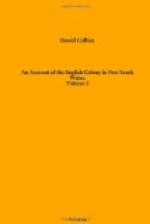They fell in with many huts along the different shores of the river, of the same bad construction as those of Port Dalrymple, but with fewer heaps of mussel shells lying near them. The natives of this place, probably, draw the principal part of their food from the woods; the bones of small animals, such as opossums, squirrels, kangaroo rats, and bandicoots, were numerous round their deserted fire-places; and the two spears which they saw in the hands of the man were similar to those used for hunting in other parts. Many trees also were observed to be notched.
No canoes were ever seen, nor any tree so barked as to answer that purpose. And yet all the islands in Frederick Henry Bay had evidently been visited.
Besides the small quadrupeds already mentioned, they observed the grey and red kangaroo, but not in any numbers, and once they heard the tread of an emu.
The feathered tribes were apparently similar to those of Port Dalrymple. Here again they daily ate their swan, the flocks of which even exceeded those that they had before met with.
The most formidable among the reptiles was the black snake with venomous fangs, and so much in colour resembling a burnt stick, that a close inspection only could detect the difference. Mr. Bass once, with his eyes cautiously directed towards the ground, stepped over one which was lying asleep among some black sticks, and would have passed on without observing it, had not its rustling and loud hiss attracted his attention the moment afterwards.
He determined on taking him alive, in order to try the effect of his bite upon a hawk which was at that time in the sloop. In the contest, he turned round and bit himself severely; in a few minutes after which he was mastered. His exertions, however, were still vigorous, and Mr. Bass expected, as he began to recover himself, that they would increase; but in less than ten minutes he died. Having never before known a snake of this size to be killed by a few very slight blows with a stick so rotten as scarcely to bear the weight of its own blow, he was at a loss to conceive how death had so suddenly succeeded so much vigour in an animal so tenacious of life. Was it possible that his own bite could have been the cause? When, three hours afterwards, the skin was stripped off, the flesh for some distance round the marks of his teeth, was found inflamed and discoloured.
The account of the Derwent river being now closed, and the whole of what was learned of Van Diemen’s land related, it may not be improper, says Mr. Bass, to point out the manner in which this country and New South Wales appear to differ in their most essential quality, that of their soil.
In adjusting their comparative fertility, the contrasted disposition of their soils is much more prominent than any inequality in their quantity. They are poor countries; but, as far as the eye of discovery has yet penetrated into either, the cultivable soil of the latter is found lying in a few distinct patches of limited extent, and of varying quality; while the soil of the former, being more equally spread, those spots of abundant richness, or large wilds of unimproveable sterility, are much less frequently seen.




